‘Non-Crime Hate’. Britain Goes Full “Anarcho-tyranny”

I bet you have never heard of a “non-crime hate incident.” So far as I know, this is an exclusively British perversion. Someone can denounce you for just thinking you said something rude about our usual pets – something entirely legal, by the way – and the police will come around and give you a stern warning. You can be written up and filed away as the perp of a “non-crime hate incident,” and you have no recourse and no appeal. This is supposed to keep real hate speech under control, but all it does is punish Brits who step out of line. Even children can be written up for “non-crime hate.”
.
.
.
His Majesty’s government has an 11,000-word webpage explaining “Non-Crime Hate Incidents,” updated last June, that explains how this works.
.
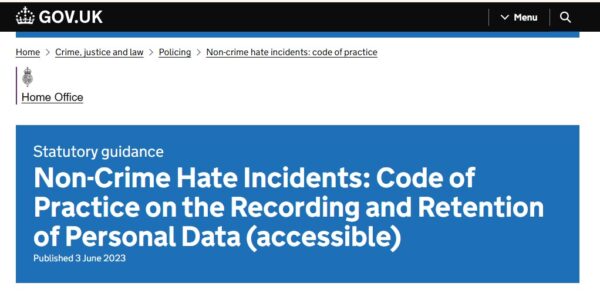
.
This sentence sets the tone:
“Freedom of expression is a qualified right which means that it can be restricted for certain purposes to the extent necessary in a democratic society.”
.

.
You can get yourself written up if you do anything that “is perceived by a person other than the subject [that’s you] to be motivated – wholly or partly – by hostility or prejudice towards persons with a particular characteristic.”
.

.
Hostility can be nothing more than “dislike” or “unfriendliness,” and the “characteristics” are the standard stuff: race, religion, sex orientation, disability. An officer can get creative: he can write up any kind of “dislike” or “unfriendliness” if he “deems it necessary to record an incident involving a different characteristic that is not covered by hate crime legislation.” And officers have.
.

.
The alleged victim – or anyone else – can rat you out. It can be something you said or did, or just a tweet. If, and only if, the investigating officer determines there was no “dislike” or “unfriendliness,” then he needn’t write up the incident. If he thinks you are a nasty character who might do it again, at his discretion, he can put you into a database. If you apply for certain jobs, such as teaching, childcare, medicine, social work, a potential employer could find you out and decide not to hire you. For something that’s not a crime! There is no provision in the law to punish or even reprimand people who call in fake or ridiculous incidents.
And many are ridiculous. “Dirty pants on washing line recorded as non-crime hate incident by police.”
.
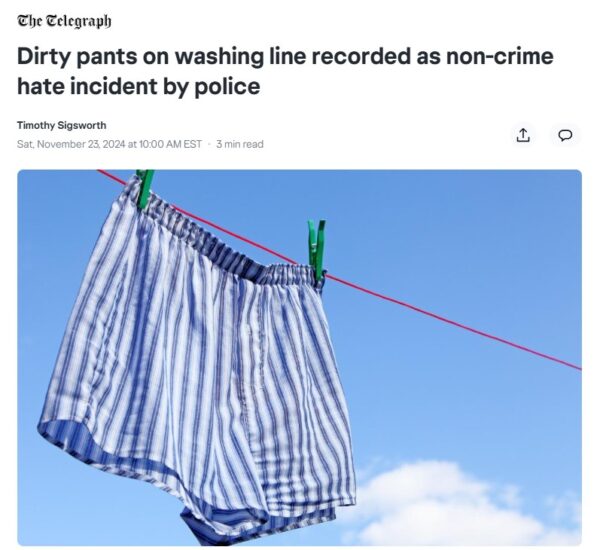
.
Someone in North Wales complained that her neighbors hung “a very large soiled pair of underpants on their washing line” and left it there for two months. She said that it was because she has an Italian name.
The same article mentions a complaint against a man who refused to shake hands with someone he thought was transexual. A Russian-speaking man claimed that a barber gave him an “aggressive” haircut after they talked about the war in Ukraine. A nine-year-old girl was written up for calling a classmate a “retard,” and two secondary-school girls got the treatment for saying that another pupil smelled “like fish.” As I said, the police can be creative.
This article says that a vicar got a visit from the police because a homosexual was “alarmed and distressed” when the vicar said homosexuality is a sin.
.
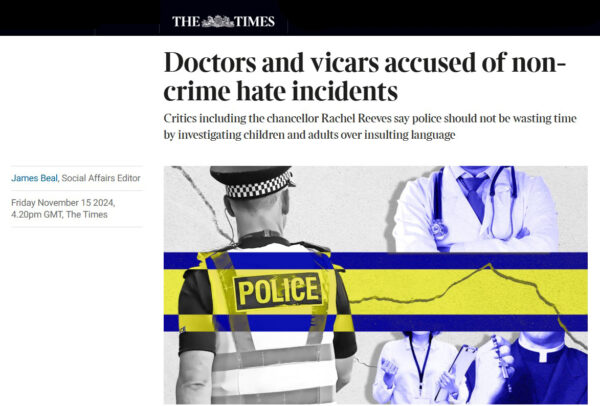
.
People get a knock on the door for “misgendering” someone. The manager of a pub got a writeup because he kicked out customers who were having sex in the restroom. The complaint claimed it was only because one of the frolickers was transgender. I guess nobody cares if normal people copulate in pubs.
The Home Office is supposed to have issued “common sense” rules to cut back on the foolishness so that write ups are reserved for “incidents ‘clearly motivated by intentional hostility’ where there is a real risk of escalation ‘causing significant harm or a criminal offence’.”
.
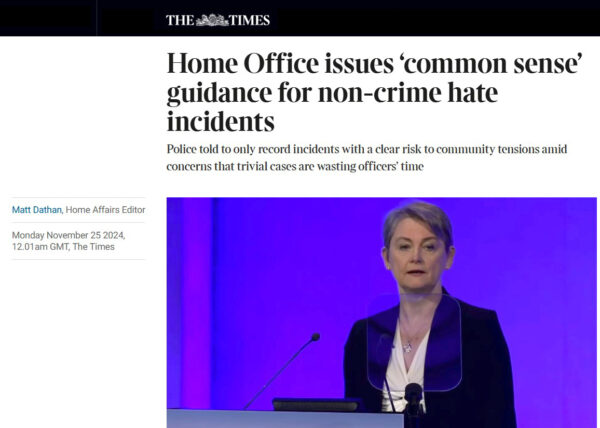
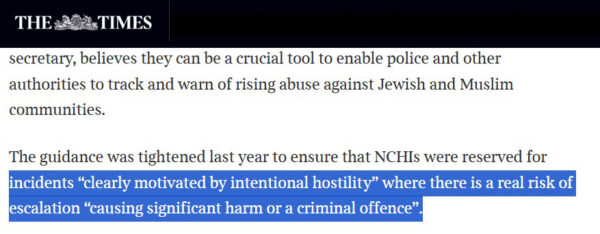
.
All of this is utterly subjective.
A lot of people think the whole business should be scrapped. The Times of London, not exactly a hot-headed journal, is running a poll that asks, “Should police stop investigating non-crime hate incidents?” When I looked, 92 percent of people said “yes” and only 8 percent said “no.”
.
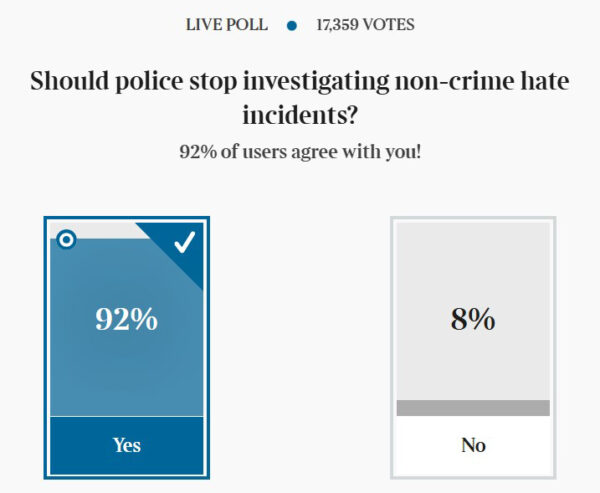
.
The current Labour government is siding with the 8 percent. The Home Office says logging this stuff “help[s] the police to build an intelligence picture around community tensions in order to map trends and prevent escalation.”
.
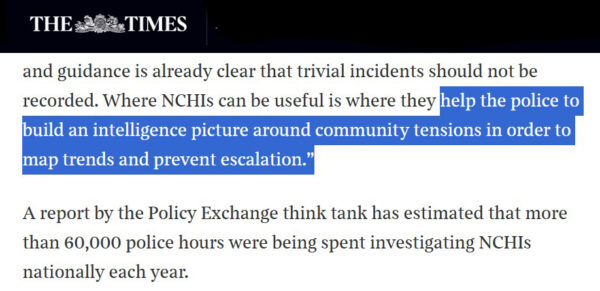
.
You never know when misgendering could escalate to murder.
Home Secretary Yvette Cooper says tracking these incidents “can be a crucial tool to enable police and other authorities to track and warn of rising abuse against Jewish and Muslim communities.”
.

.
Well. I guess that settles it.
Jewish and Muslim groups both say that “hate crimes recorded by the police relating to antisemitism and Islamophobia was a fraction of the true scale of the abuse.”
.

.
You know what? I bet every “protected category” says exactly the same thing.
The whole idea of the police investigating non-crimes is absurd. The only consequence is that people get the word: Button your lip. Don’t upset Britain’s special people.
Last year police logged more than 13,000 cases of “non-crime hate.” Each took an estimated five hours of police time, and that works out to about 60,000 cop-hours.
Britain must be wonderfully crime-free to be able to send police out to dress people down if they won’t shake hands.
Let’s see. Here is a graph of violent crimes in Britain over the last 20 years.
.
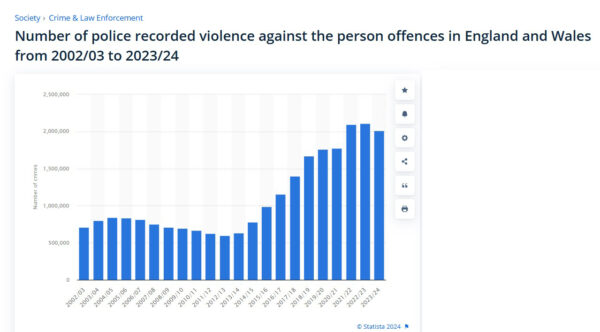
.
There has been a slight dip the last two years, but there is still well over twice as much violent crime as there was 10 years ago. What’s more, “Three in four burglaries unsolved in England and Wales last year.” That was 200,000 unsolved break-ins, and a suspect was charged in only 6 percent of cases.
.
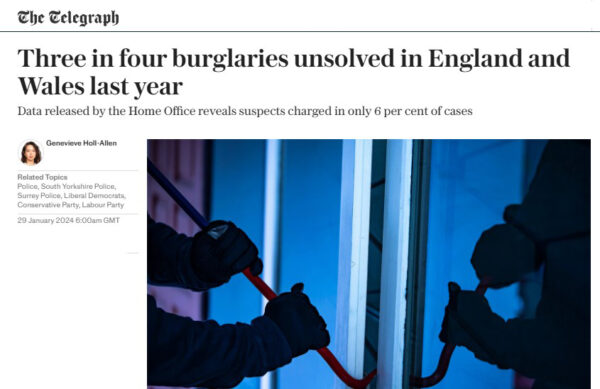
.
So far, all I’ve talked about is non-crime hate. Maybe I’ll make another video about sure-enough criminal “hate.” Apparently, there’s plenty of that, too. “Malicious communication” – and that can be just a tweet – can get you two years in the pokey and a fine for whatever the judge thinks he can squeeze out of you. You can spend seven years in the pokey for “inciting racial hatred,” and you don’t have to do anything, just say things.
These are sad times for a country that used to believe in personal liberty. Britain is a perfect example of what the great Sam Francis called “anarcho-tyranny.” Francis died in 2005, and for those who did not know him, Wikipedia helpfully explains that he was “an American white supremacist writer” – just what Wikipedia says about me.
.
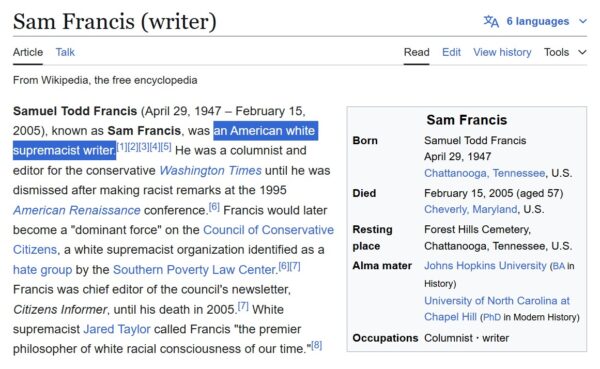
.
We get anarcho-tyranny when police can’t – or won’t – control crime. That’s the anarchy.
.

.
Instead, police go after law-abiding people like you and me for “non-crime hate incidents,” “malicious communication,” praying in school, smoking in the wrong place, jaywalking, owning the wrong pistol magazine, not wearing a bicycle helmet, etc. etc. That’s the tyranny.
These are sad times for our country, too. And Francis saw it coming 30 years ago.
*
Click the share button below to email/forward this article to your friends and colleagues. Follow us on Instagram and Twitter and subscribe to our Telegram Channel. Feel free to repost and share widely Global Research articles.
Global Research’s Holiday Fundraiser
Featured image: © Tim Pierce

